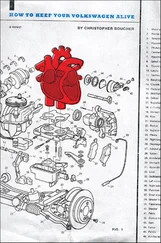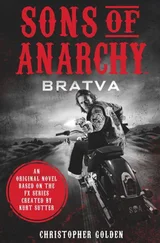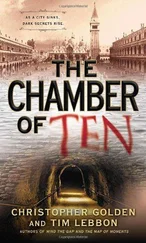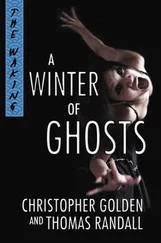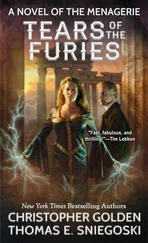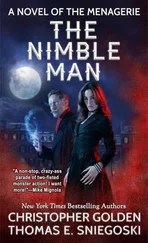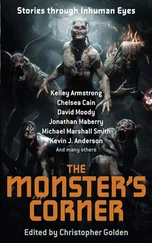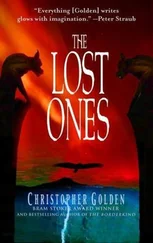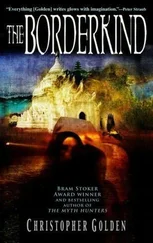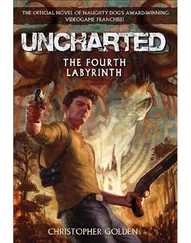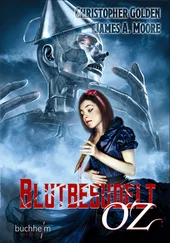“Shed,” he said.
I shook my head.
“Small house-type thing,” said The Ear.
A few days later I got tired of eating chips — either that, or the chips themselves got tired of being eaten — so I got on my Bicycle Built for Two and rode through the dark streets toward Gus & Paul’s. Pedaling down Converse, you could see how hungry people were for answers: every person’s spine was a question mark; their eyes whatted or whyed. And there were bookwormholes everywhere now: in the street, on the lawns, in the cars, in the clouds — in some of the people, even. On Burbank, a meaninglesser held out his hand to ask me for a spare theory and I saw a hole in his wrist. “A hypothesis?” he said. “A theory , even — anything.”
“Sorry,” I said.
When I got to Gus & Paul’s I found the place empty — it was just me and the deflated hat behind the counter. I walked up to the register and held up my hand in the shape of a “one.”
“One what?” said the hat.
I looked at the menu.
“One what?” he said.
I studied the choices, written in chalk. What did they mean? I couldn’t remember. Then, someone walked by with a square white box. “One of those,” I said. The hat handed me the empty box and I walked out.
Within weeks, those holes took their toll on the town. Houses collapsed; whole fields fell in. It didn’t take a bessoff to see what was happening: Appleseed was rotting.
A lot of families I knew left town. The Lonelies drove to a relative’s home in the western margin, and I heard that the Blueberry River packed a watery suitcase and hitchhiked down Five, vowing never to return.
Like everyone else who stayed, I adapted as best I could. Eventually my eyes adjusted; I learned to read in the dark. Without apples or bagels, some people survived by eating worries grown in the fields; others ate ink right off the page. One day my house went into the margin and killed a poem. He brought it back slung over his shoulder, laid the verse on the grass, removed its skin and vital organs, and handed me an iamb. “Eat,” my house said.
I tried — I smelled the words, put one on my tongue. It tasted rhymey. “I’m not sure I can eat this,” I said.
“Dip it in some melancholy,” he said, and pushed a saucer full of gritty liquid toward me. I dipped the stanza and bit into it. Word juice ran down my chin. “Not bad,” I said.
Every few days, I packed up some poem jerky and went out looking for the Reader. I’d put on my headphones, climb down a bookwormhole, walk to a new novel, and wander that novel until I found a character who seemed reliable. I’d ask them if they’d seen the Reader, if they’d heard of Appleseed, if they knew anything about a blight. I found myself in every setting imaginable — running from a giant golden machine; strapped down to an operating table in a room lit by candles; in a marketplace where people sold organs and teeth — but it was never the right story. One day, I saw someone I thought was you fixing a car in a 1930s service station. I couldn’t see the mechanic’s face, but she had your same build and she was wearing the same combat boots you used to wear — the ones with the flames on the side. I went right up to the car. “Reader?” I said.
A woman shimmied out from behind the front tire. “Help you?” she said.
Her face was a straight line, her eyebrows two exclamation points — it wasn’t you.
In another novel, I found myself in a medieval army, wearing chainmail and carrying a bow, and I thought I saw you sitting on a horse two rows over. I leaned over to the maybe-you. “Psst — hey,” I said.
“Get back in line, McRoy!” shouted the lieutenant.
Then someone yelled “Charge!” and the war began — we all stormed forward across the field, and I lost maybe-you in the fray.
Most of the time, though, I couldn’t even find the story itself — it was somewhere else in the setting, far away from where I’d arrived. And no one I met took any interest in me, or made an effort to help me find the plot. All my life, I’d read stories about people being kind, helping other people. But did anyone, in any one of those worlds, ever try to help me ? Take me in? Try to get to know me? No — not one character, ever.
If I’d found you, if I could have talked to you for just a minute or two, I would have apologized. I would have told you how sorry I was that you never had a story — no physical description, no face, not even a—
Not even a name. That wasn’t fair of me. Everyone deserves their own story. If I could have brought you back to Appleseed — if you would have let the light back in — I would have given you a whole history. I would have made you anyone you wanted to be: Johnny Appleseed, a Select Cone, a Mother, even.
Back in Appleseed, meanwhile, the sentences were going absolutely wild. Lavished in darkness, the bookworms no longer needed to hide in the margins: they strutted up and down the dark streets like they owned the place, chalking and sturming, with skomals and fortuous vays, periodical magnavoxing, lopal rikes, uring and salmoning, exclamation. What could the Mothers do against words that could change, and change again, right under your feet?
Not that they rolled over. Spondee told me that the Mothers conducted nighttime paragraph raids; I heard rumors, too, of secret underground laboratories where Mothers cultivated new word viruses and experimented on language to make it talk.
That November, though, the Mothers suffered major losses when jargons organized a simultaneous attack on every Nest in Appleseed, destroying five Nests in a single afternoon. More than a thousand Mothers were killed that day. I heard the ambulances from the basement and stepped outside to see the dark sky filled with smoke.
“Mom?” said one of my thoughts.
As I was standing there a prayer came in from my Dad. “  ?”
?”
“What,” I said.
“Mom’s OK,” he said. “She was out on assignment. She’s at an undisclosed Nest.”
The Mothers mourned and regrouped; they held a press conference a few days later to denounce the attacks and to promise more security. Every day that winter, you’d see fleets of Mothers trying to repair the town: boarding up broken storefront windows; covering open bookwormholes; transporting people with holes in them to Appleseed Hospital. Orange Traffic Cones, meanwhile, maintained status quo as best they could: they tried to keep the roads open, to protect as many stories as possible from looting or meaningloss, to deliver food to shut-ins and get people to and from work and school. When some hoodlum phrases knocked out the streetlights on Converse early that spring, a Cone even showed up at my door to drive me to school in a Cone-shaped squad car.
By that point, though, school wasn’t really school —it was mostly cages and dark, empty classrooms. Teachers were rare, and if they showed up at all they usually just stood in front of the room, staring back at the students. In Depression IV, the broom teaching the class just posed whats. “What’s the education?” he asked.
Large Odor raised his hand. “The past?” he said.
The broom shrugged. “I’m not sure,” he said. “Maybe, maybe not.”
Then Chamblis raised her hand. “What’s our homework?” she said.
“That’s a great question,” the broom said. “What is your home work?”
“The work we do at home?” said Spondee.
I left that room and went to Advanced What to Be Most Frightened Of. But the teacher in that room didn’t say anything at all — she just kept drawing sad faces on the chalkboard.
A few days later I showed up to that classroom and found it empty. I sat there for a few hours, and then I stood up and left. By then the place was a mess — the hallways were filled with garbage and torn-up books, and everything smelled like old ham and mayonnaise. On the way out the door that day — my very last day of high school ever — my sneaker kicked through a stack of papers near the art room and the pages went flying. I picked up a handful of the scattered pages; there was an old school newspaper, plus two blank diplomas and a hall pass. I kept the hall pass and one of the diplomas and threw the rest of it back on the ground. Then I walked out the heavy front doors.
Читать дальше
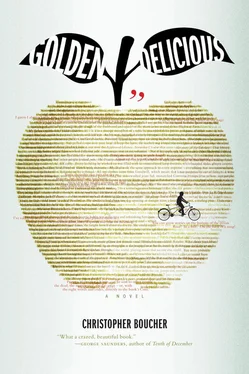
 ?”
?”
